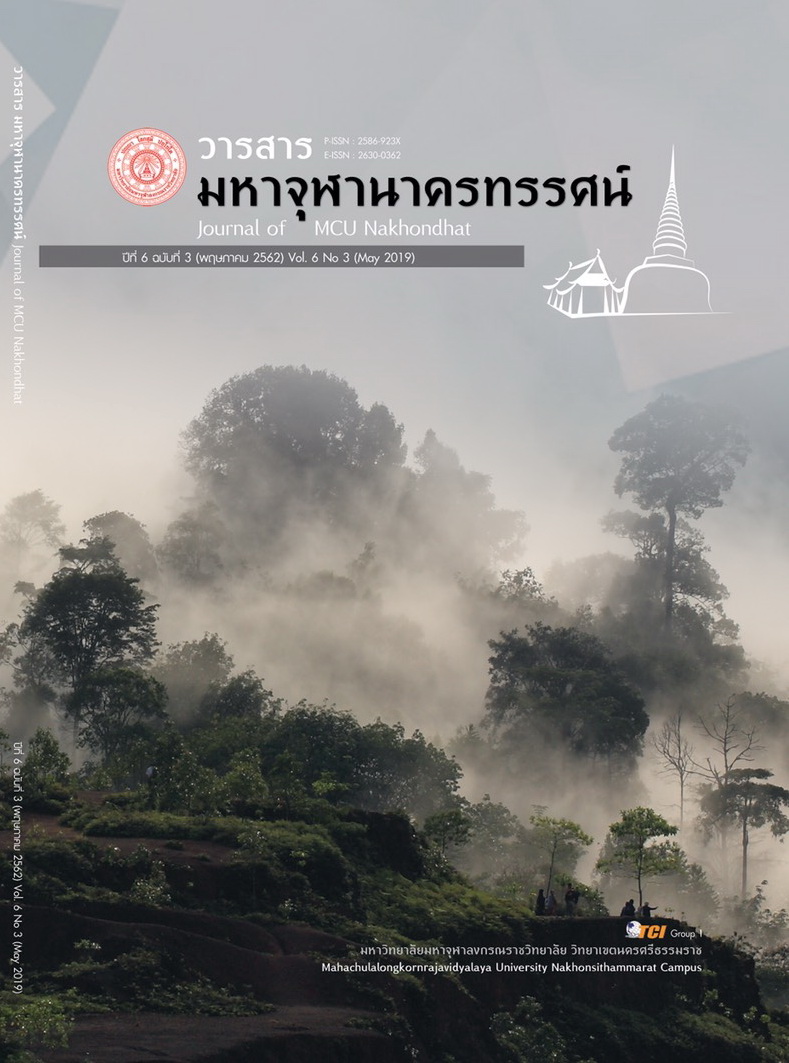HOLISTIC WELL-BEINGS PROMOTION FOR BALANCED WAY OF LIFE ACCORDING TO BUDDHIST PSYCHOLOGY
Main Article Content
Abstract
This article aims 1.to examine the holistic well-beings and balanced way of life according to Buddhist Psychology, and 2.to analyze the balanced way of life with the promotion of holistic well-beings according to Buddhist Psychology. This is a qualitative research by collecting and analyzing data from primary and secondary texts based on Buddhism and psychology. Including in-depth interviews with 5 Buddhist monks and lay scholars from Thailand, Sri Lanka, England and the United States of America. In-depth interview question form were examined by qualified experts. The findings show there are four elements of well-being that when combining together, they will arise the holistic well-beings. The holistic well-beings characterize the innate body, social moral, calm mind, and the awakening wisdom, respectively. They are the fourfold outcome of the holistic well-beings. Such outcomes are the result of the balanced way of life when the Maslow’s Needs are fulfilled. (Physiological, safety, social, esteem, and self-actualization needs). There are ways of well-beings promotion; practicing contentment, the five precepts observance, having good friends, principles of service, etc.). As a result, the “well-beings” and “balance way”, the highest purposes will be finally achieved.
Article Details
References
พระธรรมโมลี (ทองอยู่ ญาณวิสุทโธ). (2551). “การศึกษาวิเคราะห์วิถีชีวิต พฤติกรรมสุขภาพ และการดูแลสุขภาพแบบองค์รวมของพระสงฆ์ที่ปรากฏในพระไตรปิฎก”. วิทยานิพนธ์พุทธศาสตรดุษฎีบัณฑิต บัณฑิตวิทยาลัย: มหาวิทยาลัยมหาจุฬาลงกรณราชวิทยาลัย.
มหาจุฬาลงกรณราชวิทยาลัย. (2539). พระไตรปิฎกภาษาไทย ฉบับมหาจุฬาลงกรณราชวิทยาลัย. กรุงเทพมหานคร: โรงพิมพ์มหาจุฬาลงกรณราชวิทยาลัย.
วิทย์ เที่ยงบูรณธรรม. (2556). Nation’s Most Comprehensive Dictionaries: Medical Sciences Dictionary (พจนานุกรมวิทยาศาสตร์การแพทย์) พิมพ์ครั้งที่ 41. กรุงเทพมหานคร: ดวงกมลพับลิซชิ่ง.
Gerry Melino, Knight, Richard A; and Ameisen, Jean Claude. (2010). “The Siren’s Song: This Death That Makes Life Live”, Cell Death: Encyclopedia of Life Sciences, eds. by Gerry Melino, David Vaux. Chichester: John Wiley & Sons Ltd.
Fritjof Capra. (1988). The Turning Point: Science, society and the rising culture. New York: Bantam Book.
Ilya Prigogine, Stengers, Isabelle. (1984). Order out of Chaos. New York: Bantam.
Rogers Kara (ed.). (2011a). The Human Body The Brain and the Nervous System. New York: Britannica Educational Publishing.
Rogers Kara (ed.). (2011b). The Human Body The Digestive System. New York: Britannica Educational Publishing.
Simon Collin. (2007). Dictionary of Science and Technology. 2nd ed. London: A&C Black Publishers Ltd.
Talcott Parsons . (1991). The Social System. ed. By Bryan S. Turner. London: Routledge.


